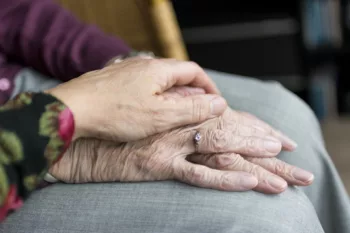Death and dying can be difficult subjects to talk about. It’s natural to want to offer support to a friend or colleague who has been bereaved. However, it can be hard to know what to say for fear of being too intrusive or saying ‘the wrong thing’. This may lead to saying nothing at all, or even avoiding the person.
Here are some ideas of how you might be able to support somebody after a loss, and some tips on what not to say.

What to expect
People are all individual, and handle grief in different ways. Your grieving friend may react differently from you, they may have different beliefs around death, or they may not want to talk about their loss – and that’s OK. What’s important is that you simply let them know you are thinking of them, ask what they need from you, and try to provide it as best you can.
People who have been bereaved may need support, but they may also need space. If the bereaved person is an acquaintance or a work colleague, they may already have a good support system helping them. Be careful not to smother them with your sympathy. Remember that silence in the conversation is OK. It can help someone think about the person they have lost.
What to do when someone is bereaved
Make contact
It’s better to say something than nothing, and to acknowledge the death of someone rather than ignore it.
Let them know you are sorry for their loss and tell them that you are there for them if they would like to talk. Don’t feel upset if your offer to talk is rejected: everyone deals with grief in different ways. Some people will seek help immediately by showing their emotions and talking to people. Others prefer to deal with things slowly or by themselves. Sometimes it helps to just be with somebody, especially if they don’t seem to want to talk.

Offer to help with practical things
A direct offer of help for something specific, like looking after children or driving them somewhere they need to go, is more likely to be accepted than “I am here for anything you need”. If the person you are supporting is the next of kin of the person who has died there may be lots of practical admin tasks for them to do, from closing bank accounts to sorting through their loved ones belongings and organising the funeral. The first couple of weeks may be busy so ask if you can support with these tasks or give practical advice, such as using a service like Life Ledger or Tell Us Once. Ideas and support for planning a funeral or writing a eulogy may be useful. It may be hard for them to stay on top of day-to-day tasks and so suggesting you can help clean or order in a pizza for them may be gratefully accepted.

Invite them to join in social activities
If there’s an activity you would usually invite the person to, don’t leave them out because they are grieving. Just let them know that you understand if they won’t be able to make it. Be understanding if they don’t want to join, but they may be really grateful that you asked and it might be helpful for them to have some normality at this time.
Grief is not linear
Remember that certain times of the year, such as birthdays, anniversaries, seasonal and religious holidays, and Mother’s and Father’s days, may be especially difficult. Try to remember these times and check in with them.

What not to do when someone is bereaved
Don’t make judgements
Don’t make a judgement about how someone is grieving or when you believe they should “move on”. Everyone grieves at their own pace and in their own way. If you have previously experienced bereavement yourself, the person you would like to support may not grieve in the same way, because we each approach it differently.
Don’t make it about your own beliefs or faith
If the person you are supporting talks about their beliefs in an afterlife, and you don’t believe in life after death, it may not be the best time to express this, especially if they did not ask questions, and they are just sharing their beliefs with you.
If you do have faith, be careful how you express this to other people who are grieving. They might not find it comforting or helpful to be told that the person who has died is “with God” or that “he or she is in a better place”. For a person without belief in an afterlife, this may not only be unhelpful but insensitive.

Don’t act as if nothing has happened, or avoid talking about the person who has died
It can feel difficult to find the right thing to say and, to avoid any awkwardness, it may seem like the safest idea would be to not mention it at all. However It can be painful for some when people say nothing. It may feel that people are acting as though the person who died never existed. Try not to avoid the subject: talk about the person who has died and share any memories you have of them.

You may not be able to support them through depression by yourself
It’s common for a bereaved person to sometimes feel hopeless, and being there to talk can be very helpful – but it’s also important to recognise when they might need some extra support.
If a deep sadness persists over months, and the person you are supporting is struggling to cope with the grief, you might see that they are not finding joy where they used to, or that they are struggling to get out of bed in the morning. They could be experiencing depression and you may want to suggest that they visit their GP to talk about how they are feeling. Alternatively they may want to make an appointment to speak to a mental health professional.
Hospice UK’s Dying Matters campaign is working to create an open culture in which we’re comfortable talking about death, dying and grief.
Resources:
A guide on supporting bereavement by Hospice UK here
A page on grief and depression by Cruse Bereavement Support here





